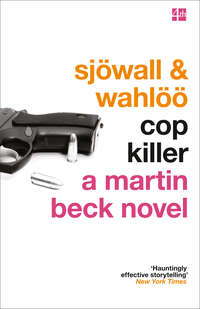
Полная версия
The Fire Engine That Disappeared
He took the metro back to the South police station in Västberga Allé.
On the way to his office, he glanced into Kollberg’s room. Kollberg was an inspector as well as Martin Beck’s assistant and best friend. The room was empty. He glanced at his wristwatch. It was half-past one. It was Thursday. It required no powers of deduction to work out where Kollberg was. For a brief moment Martin Beck even considered joining him down there with his pea soup, but then he thought of his stomach and desisted. It was already disturbed by the far too numerous cups of coffee his mother had pressed on him.
On his blotter there was a brief message about the man who had committed suicide that same morning.
His name was Ernst Sigurd Karlsson and he was forty-six years old. He was unmarried and his nearest relative was an elderly aunt in Boras. He had been absent from his work in an insurance company since Monday. Influenza. According to his colleagues at work, he was a loner and as far as they knew he had no close friends. His neighbours said he was quiet and inoffensive, came and went at definite times and seldom had visitors. Tests on his handwriting showed that it had indeed been he who had written Martin Beck’s name on the telephone pad. That he had committed suicide was perfectly evident.
There was nothing else to say about the case. Ernst Sigurd Karlsson had taken his own life, and as suicide is not a crime in Sweden, the police could not do very much more. All the questions had been answered. Except one. Whoever had written out the report had also asked this question: Had Chief Inspector Beck had any connection with the man in question and could he possibly add anything?
Martin Beck could not.
He had never heard of Ernst Sigurd Karlsson.
2
As Gunvald Larsson left his office at the police station in Kungsholmsgatan, it was half-past ten at night and he had no plans whatsoever for becoming a hero; insofar as it was no great deed to go home to Bollmora, shower, put on his pyjamas and go to bed. Gunvald Larsson thought about his pyjamas with pleasure. They were new, bought that same day, and most of his colleagues would not have believed their ears if they had heard what they had cost. On his way home, he was to carry out a minor duty which would hardly set him back more than five minutes, if that. As he thought about his pyjamas, he struggled into his Bulgarian sheepskin coat, put out the light, slammed the door and left. The decrepit lift which went up to their department went wrong as usual and he had to stamp twice on the floor before it could be persuaded to get going. Gunvald Larsson was a large man, six feet two inches in his socks, weighing over fourteen stone, and it was noticeable when he stamped his feet.
It was cold and windy outside, with gusts of dry, swirling snow, but it took only a few steps to get to the car and he did not need to worry about the weather.
Gunvald Larsson drove across Vaster Bridge, glancing indifferently to his left. He saw the City Hall with the yellow light thrown on to the three golden crowns on the spire at the top of the tower, and thousands upon thousands of other lights which he could not identify. From the bridge, he continued straight to Hornsplan, turned left on to Hornsgatan and then turned right by the Zinkensdamm metro station. He drove only about five hundred yards southward along Ringvägen, then braked.
There are as good as no buildings there, despite the fact that it is still in central Stockholm. On the west side of the street, Tantolunden, a hilly park, spreads out, and to the east there is a rocky knoll, a car park and a petrol station. It is called Sköldgatan and is not really a street at all, but rather a bit of road which for some incomprehensible reason has remained since, with doubtful zeal, the planners devastated this city district, as well as most of the others, depriving them of their original value and obliterating their special character.
Sköldgatan is a winding bit of road, less than three hundred yards long, which connects Ringvägen with Rosenlundsgatan and is largely used by a few taxi drivers or occasional lost police cars. In the summer, it is something of an oasis with its luxuriant roadside foliage, and despite the heavy traffic on Ringvägen and the trains thundering along the line only fifty yards away, the older generation of the district’s unhappy children, with bottles of wine, bits of sausage and greasy packs of cards, can operate relatively undisturbed in the undergrowth. No one is to be found voluntarily there in the winter.
On this particular evening, the seventh of March, 1968, however, a man was standing freezing among the bare bushes on the south side of the road. His attention was not entirely what it ought to have been and was only partly directed towards the one dwelling house in the street, an old wooden, two-storey building. A short while earlier, the lights had been on in two of the windows on the second floor and the sounds of music, shouting and occasional peals of laughter had been heard, but now all the lights in the house were out and the only thing to be heard was the wind and the hum of the traffic far away. The man in the bushes was not standing there of his own free will. He was a policeman and his name was Zachrisson and he was wishing heartily that he was elsewhere.
Gunvald Larsson got out of his car, put up his coat collar and pulled his fur cap down over his ears. Then he strode straight across the wide road, past the petrol station, and slogged on through the slushy snow. The highway authorities clearly did not think it worth their while wasting road salt on this useless bit of roadway. The house lay about seventy-five yards further on, slightly above road level and at a sharp angle to it. He stopped in front of it, looked around and said quietly:
‘Zachrisson?’
The man in the bushes shook himself and came up to him.
‘Bad news,’ said Gunvald Larsson. ‘You’ve got two more hours. Isaksson is off sick.’
‘Hell!’ said Zachrisson.
Gunvald Larsson surveyed the scene. Then he made a disgruntled grimace and said:
‘It’d be better if you stood up on the slope.’
‘Yes, if I want to freeze my arse off,’ said Zachrisson misanthropically.
‘If you want a decent view. Has anything happened?’
The other man shook his head.
‘Not a damn thing,’ he said. ‘They had some sort of party up there a while back. Now it looks as if they’re lying up there sleeping it off.’
‘And Malm?’
‘Him too. It’s three hours since he put his light out.’
‘Has he been alone all the time?’
‘Yes, seems so.’
‘Seems? Has anyone left the house?’
‘I haven’t seen anyone.’
‘What have you seen, then?’
‘Three people have gone in since I came. A man and two women. They came in a taxi. I think they were in on that party.’
‘Think?’ said Gunvald Larsson inquiringly.
‘Well, what the hell is one to think? I haven’t got …’
The man’s teeth were chattering so that he had difficulty in speaking. Gunvald Larsson inspected him critically and said:
‘What haven’t you got?’
‘X-ray eyes,’ said Zachrisson dismally.
Gunvald Larsson was inclined to severity and had little understanding for human weaknesses. As an officer, he was anything but popular and many people were afraid of him. If Zachrisson had known him better, he would never have dared behave as he had, that is, naturally; but not even Gunvald Larsson could wholly ignore the fact that the man was exhausted and cold, and his condition and ability to observe would hardly improve over the next few hours. He realized what ought to be done but did not plan to drop the matter for that reason. He grunted irritably and said:
‘Are you cold?’
Zachrisson gave a hollow laugh and tried to scrape the icicles off his eyelashes.
‘Cold?’ he said with dull irony. ‘I feel like the three men in the burning fiery furnace.’
‘You’re not here to be funny,’ said Gunvald Larsson. ‘You’re here to do your job.’
‘Yes, sorry, but—’
‘And one part of that job is keeping warm and properly dressed and moving your flat feet occasionally. Otherwise, you may be left standing there like a damn snowman when something happens. And then perhaps it won’t be so funny … afterwards.’
Zachrisson began to suspect something. He shivered awkwardly and said apologetically:
‘Yes, of course, that’s okay, but—’
‘It’s not at all okay,’ said Gunvald Larsson angrily. ‘I happen to have to take the responsibility for this assignment and I prefer not to be messed about by some bungler in the ordinary force.’
Zachrisson was only twenty-three years old and an ordinary policeman. At the moment he belonged to the Protection Section in the Second District. Gunvald Larsson was twenty years older and an inspector in the Stockholm Murder Squad. When Zachrisson opened his mouth to reply, Gunvald Larsson raised his large right hand and said harshly:
‘No more backchat, thanks. Get off to the station in Rosenlundsgatan and have a cup of coffee or something. In precisely half an hour, you’re to be back here, fresh and alert, so you’d better get a move on.’
Zachrisson went. Gunvald Larsson looked at his wristwatch, sighed and said to himself, ‘Rookie.’
Then he turned right around, walked through the bushes and began climbing up the slope, muttering and swearing under his breath because the thick rubber soles of his Italian winter shoes could not get a grip on the icy stones.
Zachrisson had been right in that the knoll did not offer any shelter whatsoever against the mercilessly biting north wind, and he himself had been right when he had said that this was the best observation point. The house lay directly in front and slightly below him. He could not help observing what happened in the building and its immediate surroundings. The windows were all wholly or partly covered with frosted ice and no lights were showing behind them. The only sign of life was the smoke from the chimney, which hardly had time to be coloured by the cold before it was torn to shreds by the wind and rushed away in great cotton-wool blobs up into the starless sky.
The man on the knoll automatically moved his feet from side to side and flexed his fingers inside his sheepskin-lined gloves. Before becoming a policeman, Gunvald had been a sailor, first as an ordinary seaman in the navy, later on cargo ships in the North Atlantic, and many wintry watches on open bridges had taught him the art of keeping warm. He was also an expert on this sort of assignment, though nowadays he preferred to restrict himself to planning and supervising them. After he had stood on the knoll for a while, he was able to make out a flickering light behind the window furthest to the right on the second floor, as if someone had struck a match to light a cigarette or look at the time, for instance. He glanced automatically at his own watch. It was four minutes past eleven. Sixteen minutes since Zachrisson had left his post. By this time, he was presumably sitting in the canteen at Maria police station, filling himself with coffee and grumbling to the off-duty uniformed policemen, a short-lived pleasure, for in seven minutes the man would have to be on the march back again. If he did not want to be in for the rollicking of the century, thought Gunvald Larsson grimly.
Then he thought for a few minutes about the number of people who might be in the house at that particular moment. There were four flats in the old building, two on the first floor and two on the second floor. Up on the left lived an unmarried woman in her thirties, with three children, all with different fathers. That was more or less all he knew about the lady and that was enough. Below her, to the left on the first floor, lived a married couple, old people. They were about seventy and had lived there for almost half a century, in contrast to the upper flats, which changed tenants rapidly. The husband drank and, in spite of his venerable age, he was a regular customer in the cells at Maria police station. To the right on the second floor lived a man who was also well known, but for more criminal reasons than just Saturday-night boozing. He was twenty-seven and already had six different sentences of varying lengths behind him. His crimes varied from drunken driving, breaking and entering, to assault. His name was Roth and it was he who had thrown a party for his one male and two female chums. Now they had turned off the record-player and the light, either to sleep or else to continue the festivities in some other way. And it was in his flat that someone had struck a match.
Below this flat, at the bottom right, lived the person whom Gunvald Larsson was watching. He knew what this person’s name was and what he looked like. On the other hand, oddly enough, he had no idea why the man had to be watched.
It had come about in this way: Gunvald Larsson was what the newspapers in exalted moments refer to as a murder-scout, and as at this particular moment there was no special murderer to scout for, he had been loaned to another department to be responsible for this assignment, on top of his own duties. He had been allocated a scratch collection of four men and given simple directions: Ensure that the man in question does not disappear and that nothing happens to him and note whom he meets.
He had not even bothered to ask what it was all about. Drugs, presumably. Everything seemed to be about drugs these days.
Now the watch had gone on for ten days and the only thing that had happened to the man in question was a tart and two halfbottles of booze.
Gunvald Larsson looked at his watch. Nine minutes past eleven. Eight minutes left.
He yawned and raised his arms to start beating them round him.
At that precise moment the house exploded.
3
The fire began with an ear-splitting bang. The windows in the right-hand first-floor flat were blown out and most of the gable seemed to be torn off the house, as simultaneously long ice-blue flames shot through the broken panes. Gunvald Larsson was standing on the top of the hillock with his arms stretched out, like a statue of the Saviour, paralytically staring at what was happening on the other side of the road. But only for a moment. Then he rushed, slipping and swearing, down the stony slope, across the street and up towards the house. As he ran, the flames changed colour and character, became orange and licked greedily upward along the boards. He also got the impression that the roof had already begun to sag above the right-hand part of the house, as if part of the actual foundations had been jerked away. The flat on the first floor had been in flames for several seconds and before he reached the stone steps outside the front door, it was burning in the room above as well.
He flung open the door and at once saw that it was too late. The door to the right in the hall had been torn off its hinges and was blocking the stairs. It was blazing like a giant log and the fire had begun to spread up the wooden staircase. A wave of intense heat blew back against him and he staggered, scorched and blinded, backwards down the outer steps. From inside the house came desperate screams of human beings in pain and terror. So far as he knew, there were at least eleven people in the building, helplessly barricaded inside this veritable death-trap. Presumably some of them were already dead. Tongues of flame were shooting out of the first-floor windows as if from a blowtorch.
Gunvald Larsson glanced swiftly around to see if there were any ladders or other aids. There was nothing in sight.
A window was thrown open on the second floor and through the smoke and flames he thought he could make out a woman, or rather a girl, who was screaming shrilly and hysterically. He cupped his hands around his mouth and yelled:
‘Jump! Jump to the right!’
She was up on the windowsill now, but hesitating.
‘Jump! Now! As far out as you can! I’ll catch you.’
The girl jumped. She came hurtling through the air straight at him and he managed to catch the falling body with his right arm between her legs and his left arm round her shoulders. She was not all that heavy, perhaps seven or eight stone, and he caught her expertly, without her even touching the ground. The moment he caught her, he swung right around so that he was protecting her from the roaring fire, took three steps and put her down on the ground. The girl was hardly more than seventeen. She was naked and her whole body was shaking as she screamed and tossed her head from side to side. Otherwise, he could see nothing wrong with her.
When he turned around again, there was someone else at the window, a man wrapped in some sort of sheet. The fire was burning more fiercely than ever, smoke seeping out along the length of the ridge of the roof, and on the right-hand side the flames had begun to come through the tiles. If that blasted fire engine doesn’t come soon…, thought Gunvald Larsson, getting as close to the fire as he was able. There were cracks and creaks from the burning woodwork, and showers of mercilessly burning sparks fell on his face and over his sheepskin coat, where they slowly burned their way in and were extinguished in that expensive material. He shouted as loudly as he could to make himself heard above the roar of the fire.
‘Jump! As far out as you can! To the right!’ At the same moment as the man jumped, the fire caught the piece of cloth he was wrapped in. The man let out a penetrating scream as he fell, trying to tear off the burning sheet. This time the descent was not so successful. The man was considerably heavier than the girl, and he twisted around, hitting Gunvald Larsson’s shoulder with his left arm and then thudding on to the uneven cobblestones with his shoulder first. At the last moment, Gunvald Larsson managed to get his huge left hand under the man’s head, thus saving him from cracking his skull open. He laid the man down on the ground, tore away the burning sheet at the same time irreparably burning his own gloves. The man was naked too, except for a gold wedding ring. He was groaning horribly, chattering gutturally in between times like an imbecile chimpanzee. Gunvald Larsson rolled him a few yards away and let him lie in the snow more or less out of the way of the burning timbers that were falling. As he turned around, a third person, a woman in a black bra, jumped from the now blazing flat up on the right. Her red hair was alight and she fell much too near the wall.
Gunvald Larsson rushed in among the burning planks and woodwork and dragged her away from the immediate danger zone, extinguished the fire in her hair with snow and left her lying. He could see that she was badly burned and she was shrieking shrilly, twisting like a snake with the pain. She had obviously also fallen badly, for one leg lay stretched out at a highly unnatural angle to her body. She was slightly older than the other woman, perhaps about twenty-five, and was red-haired, between her legs too. The skin on her stomach was remarkably undamaged and looked pale and slack. Her face, legs and back were most damaged, as well as across her breasts, where the bra had burned into her skin.
When he raised his eyes to the second-floor flat for the last time, he saw a ghostly figure burning like a torch, and in a pathetic spiral it sank out of sight, its arms raised above its head. Gunvald Larsson presumed that he was the fourth member of the party and realized that he was already beyond human help.
The attic was now in flames too, as well as the roof beams beneath the tiles. Thick smoke was billowing up and he heard sharp cracks from the burning woodwork. The windows furthest to the left on the second floor were flung open and someone shouted for help. Gunvald Larsson rushed over and saw a woman in a white nightgown leaning over the windowsill, a bundle pressed to her chest. A child. Smoke was pouring out of the open window, but clearly it was not yet burning in the flat, at least not in the room the woman was in.
‘Help!’ she cried desperately.
As the fire was not yet so fierce in this part of the house, he was able to stand quite near the wall, almost immediately below the window.
‘Throw the child,’ he shouted.
The woman immediately flung down the child, so unhesitatingly that he was taken by surprise. He saw the bundle falling straight at him, and at the last moment flung out his arms and caught it directly in his hands, much like a goalkeeper catching a free kick. The child was very small. It whimpered a bit, but did not cry. Gunvald Larsson remained standing with it in his arms for a few seconds. He had no experience of children and could not even remember with any certainty ever having to hold one before. For a second he wondered whether he had been too rough and had crushed it. Then he moved away and put the bundle down on the ground. As he stood there bending over, he heard running steps and he looked up. It was Zachrisson, panting and scarlet in the face.
‘What?’ he said. ‘How…?’
Gunvald Larsson stared at him and said:
‘Where the hell’s the fire engine?’
‘It should be here…I mean…I saw the fire from Rosenlundsgatan…so I ran and telephoned…’
‘Run back then, for God’s sake, and get the fire engines and the ambulance here…’
Zachrisson turned about and ran.
‘And the police!’ yelled Gunvald Larsson after him.
Zachrisson’s cap fell off and he stopped to pick it up.
‘Idiot!’ yelled Gunvald Larsson.
Then he returned to the house. The whole of the right-hand side was now a roaring inferno and the attic floor looked as if it were on fire. Much more smoke than before was pouring out through the window, where the woman in the nightgown was now standing with yet another child, a fair-haired boy of about five, wearing flowered blue pyjamas. The woman flung down the child just as swiftly and unexpectedly as before, but this time Larsson was more prepared and caught the boy safely in his arms. Strangely enough, the boy did not seem at all frightened.
‘What’s your name?’ he shouted.
‘Larsson.’
‘Are you a fireman?’
‘For God’s sake, push off now,’ said Gunvald Larsson, putting the child down on the ground.
He looked up again and was hit on the head by a tile. It was red-hot and although his fur cap deadened the blow, everything went black before his eyes. He felt a burning pain in his forehead and blood pouring down his face. The woman in the nightgown had disappeared. Presumably to fetch the third child, he thought, and at that moment the woman appeared at the window with a large porcelain dog, which she at once threw out. It fell to the ground and smashed to pieces. The next second, she herself jumped. That did not go so well. Gunvald Larsson was standing directly in line and fell in a heap on the ground, the woman on top of him. He hit the back of his head and his back, but at once heaved the woman off and began to get up. The woman in the nightgown looked unhurt, but her eyes were glazed and staring. He looked at her and said:
‘Haven’t you got another child?’
She stared at him, then hunched up and began to whimper like a hurt animal.
‘Get over there and look after the other two,’ said Gunvald Larsson.
The fire had now caught the whole of the second floor and flames were already shooting out of the window from which the woman had jumped. But the two old people were still in the left-hand first-floor flat. It had obviously not begun to burn in there yet, but they had shown no sign of life. Presumably the flat was full of smoke, and it was also only a matter of minutes before the roof would fall in.
Gunvald Larsson looked around for a tool and saw a large stone a few yards away. It was frozen into the ground, but he forced it loose. The stone weighed at least forty to fifty pounds. He raised it above his head with straight arms and flung it with all his strength through the middle of the window furthest to the left in the first-floor flat, shattering the window frame in a shower of splinters of glass and wood. He hauled himself up on to the sill, leaned against a blind which gave way and a table which fell over and landed on the floor in the room, where the smoke was thick and suffocating. He coughed and pulled his woollen scarf up over his mouth. Then he tore down the blind and looked round. The fire was roaring all around him. In the flickering reflections from outside, he saw a figure huddled in a shapeless heap on the floor. The old woman, obviously. He lifted her up, carried the slack body over to the window, took her under the arms and carefully let her down to the ground, where she at once sank into a heap against the foundation wall. She appeared to be alive but hardly conscious.








